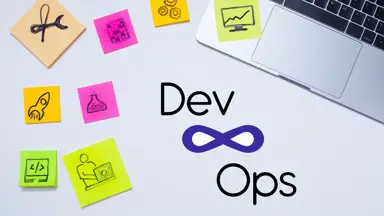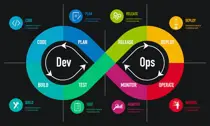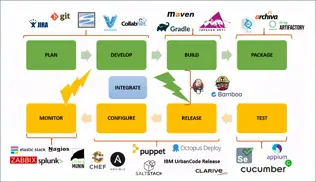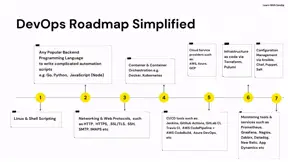What is DevOps? Skills needed to become a DevOps professional
In the current 4.0 era, DevOps has gradually become a familiar term, but what is DevOps? How does DevOps provide job orientation, and what skills are required? Let's find out with Aniday through the following article.
What is the definition of DevOps?

What is DevOps? DevOps stands for Development and Operations, which is the combination of two important roles in the software development process: developer and operator.
- The developer: is responsible for writing source code, testing, and fixing errors for the product.
- The operator: is responsible for deploying, operating, and maintaining the product in the actual environment.
You may not know this, but in the past, these two roles were often performed by two separate groups, with little communication and cooperation between them. This led to many problems such as:
- Slow product launch times
- Poor product quality
- Difficulty in resolving problems that occurred during operation.
DevOps is a method that aims to overcome these problems by building a highly collaborative culture between relevant teams, especially the development team and operations team. In addition, DevOps also applies modern tools and techniques to automate repetitive tasks, reduce risks, and increase performance.
The goal of DevOps is to create a continuous delivery cycle, in which products can be regularly updated and improved, meeting customer and market needs.
The benefits that DevOps brings

Besides understanding what DevOps is, Aniday also wants to share that DevOps brings many benefits to organizations and individuals involved in the software development process, including:
Speed
Helps shorten the time from having an idea to having a finished product, by eliminating redundant steps and optimizing necessary steps.
Accelerate the transition
Increases the ability to deliver products to customers quickly and safely, by applying the principles of continuous delivery.
Reliability
Ensures that the product always operates stably and effectively in all environments. Detects and fixes problems quickly, using monitoring and response tools.
Scale expansion
Increases the ability to scale the product by using modern technologies and architectures, such as cloud computing, microservices, and containers (docker).
Security level
Increases product security by applying software security principles and tools.
DevOps job opportunities

Next, Aniday will share with you the job orientation in DevOps. DevOps is not a specific role or title, but a skill set that spans many different areas.
A DevOps engineer may be involved in a variety of activities during the software development process, depending on the needs of the project and the organization. However, there are three main job opportunities in DevOps: Continuous Integration (CI), Continuous Delivery (CD), and Infrastructure as Code (IaC).
Continuous Integration (CI)
Continuous Integration (CI) is the process of continuously integrating programmers' source code into a common repository, then automatically checking to ensure the source code is error-free and compatible with the requirements of the product. CI helps increase the speed and quality of the development process, reduce risk, and debugging time, and improve collaboration between programmers.
Continuous Delivery (CD)
Continuous Delivery (CD) is the process of continuously deploying products from a common repository to different environments, from personal computers to mainframe servers. CD helps increase the speed and quality of deployment, reduce risk and product update time, and improve customer satisfaction.
Infrastructure as Code (IaC)
Infrastructure as Code (IaC) is the process of managing and configuring a product's infrastructure using source code instead of graphical or manual interfaces. IaC helps increase the efficiency and synchronization of product infrastructure, reduce infrastructure setup and maintenance risk and time, and enhance infrastructure reuse and scalability.
Communication and Collaboration
Communication and Collaboration are important soft skills of a DevOps engineer. A DevOps engineer must be able to communicate and collaborate effectively with various stakeholders in the software development process, from programmers to operations staff, from customers to end-users.
In addition, DevOps engineers must also be able to listen, understand, and satisfy the requirements and desires of stakeholders, as well as be able to communicate and persuade stakeholders about solutions and decisions. Good communication and collaboration tools include Slack, Trello, Jira, Confluence, Zoom, Skype, and more.
Skills needed to become a DevOps professional
Besides understanding what DevOps is, to become a DevOps expert, you need the following knowledge and skills:
Professional knowledge and skills
- Programming languages, databases, networking, security, and software architecture.
- Writing clean, optimized, and maintainable code.
- Understanding of the software development process, from design and programming to testing, deployment, and maintenance.
- Applying agile and high-quality methods (Lean).
- Ability to use cloud technologies such as AWS, Azure, Google Cloud Platform to create scalable, flexible, and secure application solutions.
Proficiency in using DevOps toolchain tools
- Using tools that support the DevOps process, such as Git, Jenkins, Docker, Kubernetes, Ansible, Terraform, Nagios, Grafana, and many others.
- Integrating these tools to create a seamless value chain from source code to product.
- Writing scripts that automate tasks such as building, testing, deploying, and monitoring applications
- Using scripting languages like Bash, Python, Ruby, and PowerShell.
Communication skills
- Knowing how to listen, understanding customer requirements, and providing appropriate solutions.
- Explaining technical decisions, problems encountered, and achieved results
- Receiving and giving constructive feedback to improve product quality and work processes.
Attention to detail
- Having a high sense of care and responsibility
- Learning how to handle problems, fix errors, and prevent risks.
- Having an analytical and problem-solving mindset to find the causes and solutions to technical problems
- Measuring and evaluating the performance of DevOps applications and processes.
DevOps Roadmap
Aniday will share with you the journey to become a DevOps professional below:

- Step 1: Become familiar with programming languages (e.g., Java, Javascript, Python).
- Step 2: Learn about the operating system (e.g., Process Management, Socket, Thread and Concurrency, I/O Management, Memory Storage, Virtualization, File System).
- Step 3: Learn to work in a terminal.
- Step 4: Learn about computer networks and security (Networking) and web protocols (e.g., HTTP, HTTPS, SSL/TLS, SSH, SMTP, IMAPS, etc.).
- Step 5: Set up infrastructure.
- Step 6: Learn Continuous Integration (CI) using tools such as Jenkins, TeamCity, Drone, etc.
- Step 7: Learn about application and infrastructure monitoring.
- Step 8: Explore cloud providers like AWS, Azure, Google Cloud Platform.
In conclusion, understanding "what is DevOps" is crucial in today's software development landscape. Aniday hopes this article is helpful to you.
References:
DevOps Roadmap: Learn to become a DevOps Engineer or SRE
Aniday's HR Services
Headhunting Service
Find and recruit quality candidates in just 1 week! Supported by 40,000 experienced headhunters in IT, Finance, Marketing… capable of recruiting in any region.
Headhunting Service ➔Employer of Record (EOR) Service
On behalf of your business, we recruit employees and handle payroll without the need to establish a company in markets such as Vietnam, Singapore, Malaysia, India, Indonesia…
Employer of Record (EOR) Service ➔